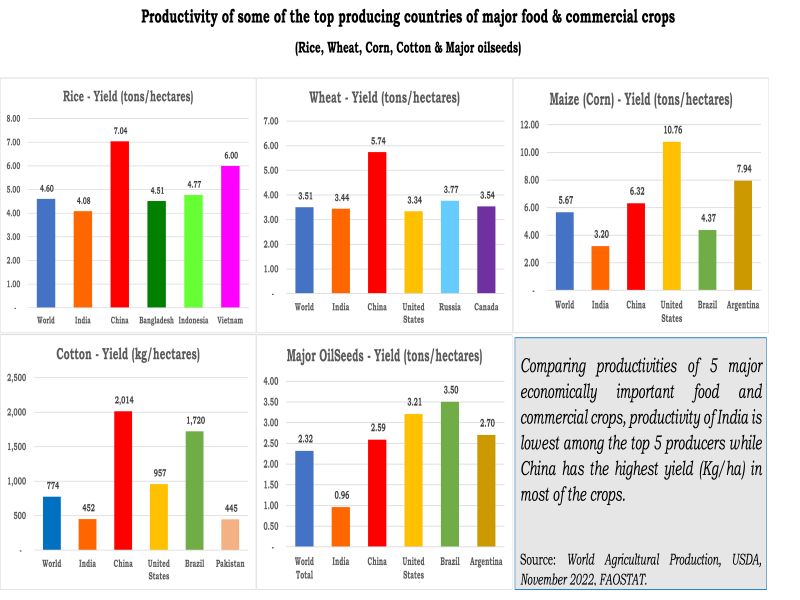Indian plant protection industry needs unleashing its inherent potential through advanced technologies and enabling policies

The earth is endangered with the burden of increasing population, more mouths to feed, shrinking arable land and climatic catastrophes. What is the scenario when it comes to plant protection?
Plant protection is paramount to sustain food and nutritional security of people of India besides enhancing the income of farmers. Panel on the Science and Technology to European Parliamentary Research services claims that without crop protection 50% of the crops will be lost in Europe. They however, opined that reduction in the use of plant protection chemicals seems possible only in case of very high actual use, and with the use of biologicals (AgNews, 2021). But pesticide consumed in India is only 52,466 tons (DPPQS, 2022-23) as against 4,09,374.74 tons (Eurostat, 2021) in EU. Further, the pesticides consumed in India for 155.37 M ha of arable land at the rate of 360 g/ha cannot be considered at all a very high use, for possible reduction. Besides, the biopesticides consumed during the same period of 7,248 tons (DPPQS 2022-23) was not even sufficient to meet the requirement of even <1% of the arable land.
India has surpassed China in population, but when it comes crop yield, why is not comparable to its neighbour?
Analysis of Higher Yields of China vs India:
Comparison of the current agricultural scenario of India and China (Table 1 & 2), shows that despite its geographical advantage with 30% more arable land and 67% more rainfall, India’s agricultural (GDP 534.21 bn USD) is around1/3rd compared to that of China (1,288.35 bn USD). However, there exist a great disparity in the use of fertilizers and pesticides, the two essential drivers for higher production and productivity between the two countries. India uses only 209.4 kg per hectare of fertilizer compared to 383.3 kg per hectare in China. Further, while India uses only 330 pesticides, including Bio-pesticides (DPPQS, 2023), more than 900 pesticides are registered for use in agriculture in China. Besides, the dosage of pesticides used in India is one of the lowest in the world with merely 360g per hectare consumption compared to 13.07 kg per hectare in China.
Table: 1 Contribution of agriculture in GDP in India vis-a-vis China
|
Particulars |
China |
India |
Source: FAO, World Bank & IMF. |
|
Arable Land |
119.49 mn ha |
155.37 mn ha |
|
|
Rainfall |
645 mm |
1083 mm |
|
|
Fertilisers consumption |
383.3 Kg/ha |
209.4 Kg/ha |
|
|
Pesticides consumption per ha |
13.07 Kg/ha |
0.36 Kg/ha |
|
|
GDP(Agriculture) |
1,288.35 bn USD |
534.21 bn USD |
Table 2: Number of pesticides registered & their usage: India vs World.
|
S. No |
Country |
No. of Regd. Pesticides |
Use per ha (Kg/ha) |
FAO STAT, June 2019 & 2021. |
|
USA |
1,057+ |
2.54 |
||
|
Italy |
NA |
5.91 |
||
|
Russia |
NA |
0.62 |
||
|
France |
467 |
4.45 |
||
|
Japan |
583 |
11.84 |
||
|
Brazil |
477 |
5.94 |
||
|
Vietnam |
450+ |
1.66 |
||
|
China |
950+ |
13.07 |
||
|
Israel |
900 |
12.6 |
||
|
India |
330 |
0.3 |
Since the green revolution the food production increased by >4 times from 82.02 million tonnes in 1960-61 to 323.55 million tonnes in 2022–23 (2nd AE, DES-DAC&FW, MoA&FW, 2023). During the same period our horticulture production too assumed all time high of 342.33 million tons. As a result, today India ranks first in the production of pulses, pearl millet, Jute, milk and fruits like mango, banana, papaya, lemon & lime and second in production of paddy, wheat, sugarcane, groundnut, rapeseed mustard, tomato, potato, cotton, etc (FAO, 2022; DARE - Annual Report 2021-22).
However, the food grains that are surplus for the present populations will not be able to sustain food requirements of 516 million tons at the rate of 60% increase in demand for the 1.66 billion people by 2050 (as per Normative Approach based on Calorie Requirement recommended by ICMR, NITI Aayog 2018), unless there is increase in food production. Thus, production must be increased by more than 50% of the present production. With no further scope of increasing arable land and with the near plateauing production of major crops with available technologies, “Improving productivity is the only option left for India to achieve growth in agriculture sector as arable land is shrinking” – remarked by Prof. Ramesh Chand, Farm Economist, NITI Aayog (Mint, 2022).
Globally, where does India rank in terms of crop production and productivity viz-a-viz other advanced countries?
Productivity of the Top Producers of Major Food & Commercial crops:

Note: Crop data is for the year 2020-21. Russia numbers for winter season wheat. Major oilseeds including soybean, sunflower, peanut, cottonseed and rapeseed/mustard.
From the above figure, it is apparent that amongst the top 5 highest producers of major crops during 2022, the productivity of India was the lowest. Among the highest producers (Argentina, Brazil, Canada, China, Egypt, France, Germany, India, Israel, Italy, Japan, Malaysia, Mexico, Netherlands, Norway, Russia, South Africa, and USA), China had the highest yield (Kg/ha) of most of the major food and commercial crops (USDA, 2022).
The gap in crop production and productivity between India and advanced nations shows that this sector has great potential that needs to be realized. Deployment of advanced technologies, internalisation of GM Crops, high-quality seeds, fertiliser, agrochemicals, and efficient management of natural resources. All of these factors can enhance crop production and productivity to the great extent, but not beyond 10% at a single go than that could be achieved through saving the crop losses due to pests and diseases of 20-40% (FAO/CABI, 2023). A conservative estimate of 20% crop losses due to pests and diseases at current agricultural growth rates translates to loss of ~66 million tonnes of food grains and ~69 million tonnes of horticultural production. These alarming losses, if saved, could feed an additional population 25-30 crore even without increasing production. While we do not advocate for the excessive use of chemical fertilisers and pesticides, we must support their judicious application for optimal crop yields.
How is the Union Government transforming the Indian agriculture sector into a game-changer to benefit the farmers and ensure food security?
Our Hon'ble Prime Minister, Shri Narendra Modi, gave a further boost to growth in agriculture through a series of advanced technologies and farmer welfare schemes and policies that will serve to sustain its growing population and making India to become the global food basket. The approval of GM Mustard and deregulation of genome editing for crop improvement are welcome and appreciative policy decisions that undoubtedly will enhance crop yields further. Continued agricultural growth and global competitiveness awareness can help India achieve the Hon'ble Prime Minister's ambitious target of generating USD 5 trillion in GDP by 2027, with more than USD 1 trillion coming from agriculture.
To make Indian agriculture a game changer to economic prosperity and sustainable livelihood for farmers the plant protection industry needs enabling policies to overcome its inherent challenges thereby emerge as China +1, food, and agrochemical supplier.
The initiatives outlined in the Interim Budget 2024-2025, undoubtedly reflect the government's commitment to the agricultural sector and for the betterment of the farmers’ of our nation including the direct benefit transfer under which government has been transferring 6000 rupees per year to the farmers.
Furthermore, I welcome the announcement of allocating 1 lakh crore rupees towards innovation and Research & Development (R&D). This investment is crucial as Indian agriculture needs cutting-edge, in-house technology to enhance the livelihoods of farmers. In the long run, I propose a greater focus on the extension system, with increased coverage through public private partnerships. Your good self has quoted the slogan, “Jai Jawan Jai Kisan” by Shri Lal Bahadur Shastri Ji, “Jai Vigyan” added by Shri Atal Bihari Vajpayee Ji and ‘Jai Anusandhan” added by our dynamic PM, Shri Narendra Modi Ji and this step of establishing the corpus of 1 lakh crore rupees is totally aligned with the government’s focus on promoting in house research and development.
Could you elaborate on the challenges being faced by the Plant Protection Industries impeding its optimum potential?
Challenges faced by Plant Protection Industries:
Data protection is vital for players in this industry. How can increased spending on cutting-edge technology ensure that data is safe?
The Secretary, Department of Chemicals & Petrochemicals, GoI, reported on 31 May 2007 that data protection is essential to attract new technologies in various sectors. Since India is a TRIPS signatory, it must comply with IPR requirements, including data protection under article 39.3. USA, EU, Canada, Japan, and China protect data for 6-10 years. In addition, the 46th Standing Committee on Agriculture (2008-2009) on the Pesticides Management Bill 2008 recommended 5 years of data protection for agrochemical stewardship. To attract MNCs to invest in India, the government must align Indian laws with global regulatory norms to bring new and advanced technology in the country to save the crops against epidemics of new pest which might have inherent resistance to existing pesticides.
Research is integral aspect of the agriculture sector. When it comes to research where does India lack and needs more focus on?
In a digitally empowered era, using technology for dissemination of advanced technology is vital for the farmer’s growth. What is your opinion on this aspect?
(Dr. R.G. Agarwal, is the Group Chairman of Dhanuka Group, & Family Charitable Trusts, based in Gurugram, Haryana. Under his dynamic stewardship, the Dhanuka Group grew to become a leading Agritech (Crop Protection chemicals) & Pharma Business House in the country, with interests in Crop Protection, Spray Technology, Pharmaceuticals, and taking new technologies like IT, IoT, Precision agriculture, Drones and increasing protection, quality yield, and farmer’s income.
He also pioneered DAESI (Diploma in Agricultural Extension Services for Agri-Input Dealers) in collaboration with MANAGE, Hyderabad,
Dr. Agarwal served as Chairman of the FICCI Crop Protection Committee, Chairman of the Crop Care Federation of India (Erstwhile Pesticides Association of India), Advisor, Agro Chem Federation of India, and Director, CLI.
In view of his very distinct contributions to famers welfare, and many social, religious activities for the benefit of society at large, Dr. Agarwal has been honoured with several coveted awards, namely, Forbes Award - 200 Best under A Billion Companies in Asia Pacific - 3 times, Life time achievement award by CHAI, FICCI and many more.)
Subscribe to our newsletter & stay updated.